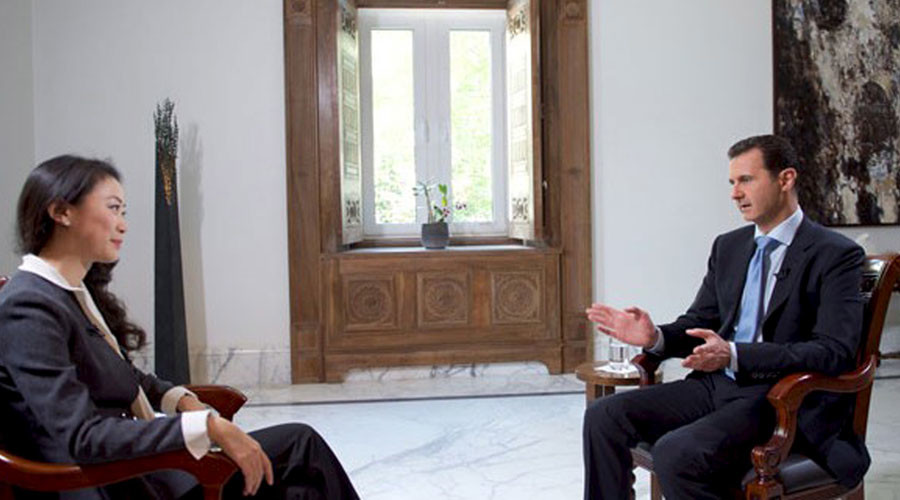Middle East Intervention
"I don't think we should expect any major results. Assad really believes that time is on his side, that he is winning, that the opposition is in tatters."
Fawaz Gerges, professor, Middle Eastern politics, London School of Economics
"It [opposition] is a political term, not a military term. Whenever you hold a machine gun, you are a militant, you are a terrorist, whatever you want, but you cannot call 'opposition' people who hold machine guns or any kind of armaments."
"What we are doing in parallel besides fighting terrorism, we need to make the dialogue, but the concrete steps should follow at least a major defeat of the terrorists and the government takes control of a major area that has been captured by the terrorists."
Syrian President Bashar al Assad
 |
It wasn't all that long ago that Syrian President Bashar al Assad had very good reason to understand that his regime was on its death ropes. The knell of its demise hovered close on the horizon with the many successes of the rebels, along with the Islamists that had predictably flooded Syria. With the regime exercising its violent spleen on its Sunni Syrian population, punishing civilians for their perceived support of the Sunni rebellion, the Islamic State militants were getting the upper hand as far as amassing territory was concerned.
Iran's support through its al-Quds division of the Revolutionary Guard Corps, the intervention and aid of the seasoned Hezbollah fighters, and Iran's Shiite militias did give Assad some breathing room, but it simply wasn't enough. The Sunni-backed Islamist groups were moving ahead, pushing back the Alawite regime and threatening its stronghold. What it took, presumably, was a visit from the Iranian general to Moscow, to convince the Kremlin that their interests would be impaired if they did nothing.
So in came the Russian military, denied strenuously at first, as is the Russian way, then finally confirmed with a firm pledge that Russian airstrikes would target the nemesis of the West, the Islamic State groups primarily. Except that ISIL as targets of Russian air strikes was incidental to Moscow's support for the regime's battle with its own Sunni rebels, and it was they who bore the brunt of the attacks with predictable results, since they had no air power of their own.
The U.S. was unwilling to commit to a combatant-assistance role in the civil war in Syria; burnt too often in involvement in Middle East and Muslim conflicts. Nor was the Obama administration interested in fighting a proxy war with Russia over Syria. Afghanistan and Iraq and Libya loomed large in shadowy memory as rebukes to American military interventions. So action was ruled out and inaction seeped into the picture by default, which led to the emergence of Russian President Vladimir Putin, guaranteeing the survival of a tyrant who slaughters his own.
In the process of that disengagement from the power structure the United States alienated its traditional allies who perceived him as submitting both to Tehran with its own ambitions to become the power broker of the region, and to Moscow which was willing to share with Iran that ambition. The result has been a humanitarian disaster that has slopped over into neighbouring countries straining their resources, and further along into Europe, causing a landslide of reaction and agitation for the European Union's cohesiveness.
And now, because of Russia's muscular intervention that is being reversed and the opposition divided. There is an estimated thousand feuding militias and they disagree about strategy and purpose and they violate one another's strengths. It was the rebels themselves that have crushed their effectiveness by their divisive bickering.
Hand in glove with the aircraft, helicopters and tanks that Russia is advancing to pound the Victory Army, rebel and Islamist morale has plunged. Flying close to 200 sorties daily has permitted Assad the effective offensive on the ground, covered in the air. Talks in Geneva have become another arguing session over who should go, who not. Anyone heading off to Geneva would be guilty of "high treason", so proclaimed the leader in Syria's al-Qaeda group; as good a threat of death as any other statement.
It has been a struggle, a learning process which hasn't quite been learned, that the removal of a tyrant in the Middle East will present a vacuum that will inexorably be filled and unsurprisingly, given the general dysfunction of tribal and radical sectarian groups, filled by a vicious menace whose attitudes and atrocities make the tyrant's exploits appear mild by comparison. Radicalization and fragmentation has been the result everywhere that rigid authority has been removed, from Iraq to Yemen, Libya to Syria.
And wherever Sharia law has been imposed to complement the administration of Islamist groups whose fundamentalism is a reflection of 'authentic' Islam, schools become segregated, women must wear the full coverings of niqab or burqas, and the basic infrastructure of civil life is neglected while ethnic and religious minorities are given the generous choice of either fleeing or converting to Islam. And the Islamists busy themselves destroying any vestiges of ancient religious artefacts, venerated symbols of the heritage and the past of the region.
There, then is the choice in the Middle East; settle for the unnerving presence of a tyrant for whom the very concept of human rights is as foreign as it is for those who move in to replace him if he is removed, or prepare to see the outrages committed by that tyrant multiplied beyond belief by his successors.


<< Home